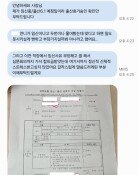Abductees Family Angry at Government
Abductees Family Angry at Government
Posted December. 21, 2006 06:54,
In South Korea the abductees to North Korea and their families are criminals, not victims.
Kim Se-nyeon (23 at the time of abduction), the elder brother of Kim Se-cheol (45), left home to work in the Village of Liberty in Daeseong-dong in the Demilitarized Zone in February 1975 and was heard of no more after he was kidnapped to North Korea by the North Korean soldiers in August the same year.
The Headquarter of UN Force in South Korea announced that at around 4:15 P.M. on 26th two armed North Korean soldiers invaded into Daeseong-dong region and abducted a South Korean civilian by force. The kidnap of Kim to North Korea was covered on the first page of this newspaper on August 17, 1975.
Later, Lee Won-gyeong, then Minister of Culture and Communication, announced a statement, saying, We censure the inhuman act of violence by North Korea in the name of our nation. A large-scale impeachment rally was held decrying the kidnap in Munsan, Paju, Gyeonggi Province.
Within a month, however, the most of the world forgot about Kim. Ironically the Kim family had to live through the military dictatorship years as quietly as possible, being under the surveillance of the public security authority. The family members even dreaded mentioning Se-nyeons name, let alone requesting the authority to confirm whether he was dead or alive. After democratization, Se-cheol even thought of giving up trying to find out whether his brother was dead or alive, when the government seemed to avoid even mentioning the kidnap issue fearing how North Korea would react. In the meantime, both his parents and his younger brother passed on.
Thirty years spent as a criminal-
According to the workers who worked with Se-nyeon in the farm fields, two North Korean soldiers gave him a blow on his shoulder with the butt plates of their guns and dragged him to North Korea.
His father, who roamed about as if deranged at such shocking news crying out please find my son, one day had a talk with someone and said to his family quietly, Do not tell the facts to anybody else. Otherwise we can put ourselves in jeopardy, and dropped his head.
The public security authority only showed concern in whether the abducted would return as a brainwashed spy. I found out later that the families of other abductees were afflicted in the same manner as me.
Being unable to even drop a word about his eldest sons abduction to North Korea, his father solaced himself with drinking and deceased in seven years due to bad health. His mother asked about her son to the last moment of her life.
Se-cheol was no exception from the surveillance. It was not rare that somebody shadowed him.
Government was unaware of the abductions-
Kim Se-cheol braced oneself up when heard that the government put up an advance notice on the legislation of the Special Act to Aid the Families of Abductees to North Korea after the news spread last June that Kim Yeong-nam, who had been kidnapped in Seonyudo to North when he was in the first grade of high school, reunited with his family.
But the Ministry of Unification told him that [his brother] was not on the list of those kidnapped to North Korea and [the Ministry] did not have the authority to scrutinize facts about those abductees not listed and that [the ministry] does not have the reserve of energy to find out facts on abductees to North Korea which would involve canvassing a history of sixty years. The Ministry of Unification shifted blame saying, Examining abductees is the duty of the National Intelligence Service.
The National Intelligence Service only said, The official estimation of the status of abductees to North Korea falls under the jurisdiction of the Ministry of Unification.
The Ministry of Unification anticipates that the investigation on the status of abductees to North Korea will only be possible when the Special Act on the Abductees to North Korea is passed. But it seems quite likely that the Special Act announced in advance by the government will go through this year without passing the National Assembly.
During the dictatorship years they made use of us in their anti-communism campaign for a while, but soon shifted to oppressing us that [the kidnapped] might return as a spy, and after democratization they neglected us, fearing the mood of North Korea. Whatever is the state of those kidnapped to North Korea and their families? Se-cheol cried out.
zeitung@donga.com
Headline News
- N. Korea launches cyberattacks on S. Korea's defense companies
- Major university hospital professors consider a day off each week
- Italy suffers from fiscal deficits from ‘Super Bonus’ scheme
- Inter Milan secures 20th Serie A title, surpassing AC Milan
- Ruling and opposition prioritize spending amid tax revenue shortfalls







